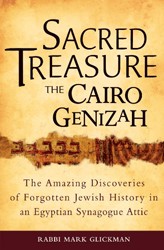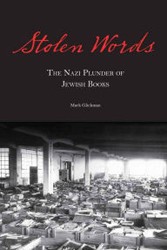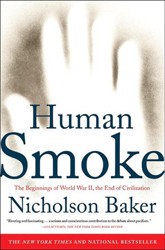With the release of Stolen Words: The Nazi Plunder of Jewish Books, author Rabbi Mark Glickman is guest blogging all week as part of the Visiting Scribe series here on The ProsenPeople.
The battle had been rumbling for years, but on December 1, 1946, at New York’s Waldorf Astoria hotel, a Jewish historian met with an American military leader and the fighting finally came to a close.
This wasn’t a bloody battle between armies; it was a conflict between Jews. And here, the battle wasn’t over land or national boundaries. Here the battle was for books.
The Nazis had looted lots of Jewish books during their twelve-year reign — millions of them. Early on, they burnt some of those volumes in spectacular bonfires, but the bonfires didn’t last very long. After they fizzled, various Nazi agencies simply held onto the books instead, storing them in castles, monasteries, and warehouses until they could be processed after the war.
The Allied Forces that discovered these looted libraries sent much of the material to an archival depot in Offenbach, Germany run by the American army. Whenever possible, the army returned the material to its original owners. But many of those owners had perished during the war — and many of the books’ owners couldn’t even be identified to begin with: often, entire communities had fled for their lives, leaving their rich collections of books behind. In the chaos of postwar Europe, where were all of the remaining books supposed to go?
Of course, different groups of Jews disagreed with one another on this question. Jews in the soon-to-be State of Israel argued that Israel was to be the international capital of the Jewish people, so the books should go there. American Jews countered that the United States now had the largest Jewish community in the world, so the books should come here. Survivors groups in Europe argued that the books should stay at home, and various other countries each weighed in with arguments as to why they should get the books instead.
At the center of the battle were three men — intellectual powerhouses who became generals in the battle for the books even before the war drew to a close.
One was an Oxford University historian named Cecil Roth (1899 – 1970).Roth, who was head of the Jewish Historical Society of England, and, later, the editor of the first edition of Encyclopedia Judaica, spoke about the looted books as early as 1943. There was certainly going to be a lot of unclaimed literature after the war, he predicted, and that unidentified material should be sent to the Hebrew University in Jerusalem. He set up a committee to begin inventorying the books and preparing them for shipment to Palestine. The committee soon dissolved, but Roth prided himself that his group was the first to deal with the issue, and he later argued that his group should therefore be in charge of determining what to do with the heirless volumes.
Another lead combatant was Rabbi Judah Leon Magnes (1877 – 1948),the American-born founding president of Hebrew University. When Magnes heard early proposals that the books should go to America or stay in Europe, he was beside himself. Just as Israel was taking in the lion’s share of the human survivors of the war, he argued, so too should it receive Europe’s surviving Jewish cultural treasures. How could anyone think otherwise?
Finally, there was Salo Baron (1895 – 1989).Galician-born and Vienna-educated, Baron had been on the faculty of Columbia University since 1929, and had played a key role in bringing Jewish studies to the secular American academy. Baron was also a rising leader in the Conference of Jewish Relations, an American group of scholars looking into anti-Semitism in Europe, the United States, and elsewhere. He sent a team to Europe to catalogue the continent’s pre-war Jewish treasures, and tried to chart a course to deal with the cultural devastation that would remain at war’s end.
 In time, Cecil Roth stepped into the background, leaving Baron and Magnes to duke it out between themselves. Magnes fought like a bulldog to get the books into his university’s library, but as he did, Baron built a worldwide team of Jewish historians, librarians and other scholars, and founded “Jewish Cultural Reconstruction” (JCR) — an international commission whose main purpose was to figure out what to do with the heirless Jewish books and cultural treasures after the war.
In time, Cecil Roth stepped into the background, leaving Baron and Magnes to duke it out between themselves. Magnes fought like a bulldog to get the books into his university’s library, but as he did, Baron built a worldwide team of Jewish historians, librarians and other scholars, and founded “Jewish Cultural Reconstruction” (JCR) — an international commission whose main purpose was to figure out what to do with the heirless Jewish books and cultural treasures after the war.
In the end, Baron’s cooperative approach won the day, and on December 1, 1946, he and a group of his lieutenants met at the Waldorf Astoria Hotel with General Lucius Clay, head of the United States Army’s occupational forces in Germany, to finalize the arrangements. As America prepared to end its occupation of Germany, the army would turn the heirless treasures over to JCR. JCR, in turn, would put the treasures into trusteeship and determine what their ultimate fate should be.
In the years that followed, JCR distributed millions of books and other looted cultural items to Jewish libraries and organizations around the world. About forty percent went to the United States, forty percent went to Israel, and the remaining twenty percent went out in smaller batches to other countries.
Salo Baron prevailed in his struggle for leadership of postwar book restitution efforts, but let’s not call him the victor. In the post-Holocaust Jewish world, loose ends could be tied up, but the possibility of victory had long since disappeared as smoke through the chimneys of Nazi destruction.
Rabbi Mark Glickman has served at congregations in Ohio, Washington State, and Colorado. He is the author of Stolen Treasure: The Nazi Plunder of Jewish Books and Sacred Treasure — The Cairo Genizah: The Amazing Discoveries of Forgotten Jewish History in an Egyptian Synagogue Attic.
Related Content:
- Pam Jenoff: Faith and Fiction: Pam Jenoff’s Journey to Becoming a Novelist
- Boris Fishman: It’s the First Week of June: Do You Know Where Your Family History Is?
- Barbara Stark-Nemon: At the Heart of It
Rabbi Mark Glickman has served at congregations in Ohio, Washington State, and Colorado. He is the author of Sacred Treasure — The Cairo Genizah: The Amazing Discoveries of Forgotten Jewish History in an Egyptian Synagogue Attic.




